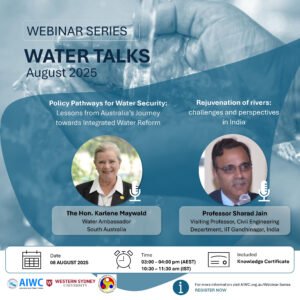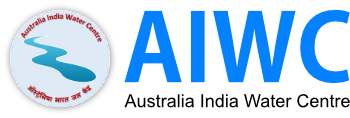WATER TALKS | October 2025
10 October 2025
Time: 3:00 – 4:00 pm (AEST)
10:30 – 11:30 am (IST)
Evaluation of direct use of recycled water compared to indirectly recharged borewell water and rain-fed borewell water on soil and crop parameters in Semi-arid regions
Professor L N Rao
Water scarcity is a pressing global challenge, particularly in arid and semi-arid regions. The agricultural reuse of recycled water (RW) offers a dependable solution to reduce reliance on freshwater resources. However, in developing countries, the suboptimal quality of RW often limits its direct use in agriculture. While indirect groundwater recharge through soil aquifer treatment (SAT) using treated wastewater provides a sustainable alternative, the associated pumping costs have amplified the demand for direct RW. Understanding the effects of direct RW irrigation compared to indirectly recharged borewell water (IRBW) and rainfed borewell water (BW) is essential for informed agricultural decisions in water-scarce regions. This study evaluates the water quality of three irrigation sources: direct RW (partially tertiary treated), IRBW, and BW (control), and their effects on soil properties, crop parameters, and the performance of five crop types using flood irrigation in a field experiment. The results revealed significant differences in water quality for selected physicochemical properties but no notable variation in microbial species. Direct RW irrigation had no significant adverse effects on soil physicochemical properties or microbial diversity, apart from parameters like EC, bulk density, available P, K, and Cl. Similarly, no major differences were observed in crop agronomic parameters among the three irrigation waters, except for a higher germination rate in Marigold when irrigated with RW. Macronutrient content was notably higher in crops irrigated with RW, contributing to a positive effect on overall crop yield. Moreover, there were no significant differences in microbial content or shelf life among harvests irrigated with direct RW, IRBW, or BW. These findings highlight that appropriately treated wastewater can be safely used for direct irrigation, promoting a circular economy approach that recognizes wastewater as a viable freshwater substitute. This practice boosts water-use efficiency and resilience in water-scarce regions, aligning with Sustainable Development Goals (SDGs) 2, 6, 11, 12, 13, and 15. Lakshminarayana Rao received his B.E. (Chemical Eng.) from Bangalore University, M.Sc. (Eng) from Metallurgy IISc, and Ph.D. from the Department of Chemical Engineering, McGill University, Montreal, Canada. Prior to joining CST-IISc, he worked in the industry both in Canada and India, developing technologies in the areas of wastewater treatment and reuse, rainwater harvesting and groundwater recharge. Dr. Rao joined CST-IISc in April 2016 and currently leads the Plasma Lab group. The Plasma lab group explores translational research in the areas of plasma-activated water for medicine and agricultural application, municipal solid waste to energy, and cold plasma hydrocarbon reforming. The plasma lab group has also developed decentralized wastewater treatment and recycling technologies for isolated communities and wastewater carrying Nala’s.
Urban Decentralised Water Recycling: Opportunities for Irrigation
Mr Alex Sommer
In this presentation, Alex will begin with an introduction to Aquacell, providing an overview of the organisation and its work in the field. The session will then explore landscape of decentralised water recycling in Australia, highlighting the key drivers behind the growing interest in water reuse. To illustrate these concepts, Alex will present examples and case studies of both in-building and off-grid schemes. The presentation will also examine the role of irrigation within the water recycling systems and discuss what these developments mean for the future of agriculture.
Alex Sommer leads Aquacell’s business development and sustainability for the Australian market. In previous positions within state government, listed developers and industrial manufacturers, he developed water efficiency and water stewardship strategies and programs as part of his broader sustainability and ESG remit. At Aquacell his mission is to drive the discourse on climate and economic resilience through water recycling, providing end-to-end in-building and decentralised wastewater treatment and reuse solutions.
_____________________________________________________________________________________________________________________________
WATER TALKS August 2025
8 August 2025
Great Discussion
Listen to the full webinar on YouTube WATER TALKS AUGUST 202
Policy Pathways for Water Security: Lessons from  Australia’s Journey towards Integrated Water Reform
Australia’s Journey towards Integrated Water Reform
Karlene Maywald, Global Water Leader and Climate Resilience Advocate
Karlene Maywald is an internationally respected water policy expert and governance leader, currently serving as the South Australian Government Water Ambassador. With a career spanning ministerial leadership, international advisory roles, and community recovery efforts, Karlene has consistently championed the message that climate change is water change.
As South Australia’s former Minister for Water Security and the River Murray, she led landmark reforms during the Millennium Drought, including the state’s Water for Good strategy and major infrastructure investments. Internationally, she has worked across Asia supporting climate-resilient water governance and transboundary cooperation through the Australian Water Partnership.
Karlene chairs WaterAid Australia, the CRC for Solving Antimicrobial Resistance, and the Cancer Council SA, and advises CSIRO and WaterTrust. A sought-after global speaker and facilitator at events like COP27, COP28, COP29 and World Water Week, Karlene is a driving force for inclusive, sustainable water futures.
Rejuvenation of Rivers: Challenges and Perspectives in India
Professor Sharad Jain, Visiting Professor, Civil Engineering Department, IIT Gandhinagar, India
Worldwide, rivers are facing degradation due to various reasons. Since a degraded river is harmful to the ecosystem, society, and sustainable development, governments are keen to rejuvenate degraded rivers. Rejuvenation of a river requires that the flow be restored as close to the natural conditions as feasible in terms of quantity, timing, and variability, with acceptable deviations. Also, the quality of flowing water should be about the same as it was at some earlier time (typically close to ‘pristine’ conditions), and the river corridor should be clean with no encroachments/ construction on floodplains. It is noted that due to socio-economic pressures and inefficiencies, many river rejuvenation efforts have only been partially successful.
This talk will identify the causes of river degradation in India and will discuss success as well as not-so-successful stories. It is seen that efforts to revive rivers have succeeded where political and administrative support is strong, the public was involved, the budget was adequate, and the right technology was used. The right approach for river revival also depends upon the scale of application.
Dr Sharad Jain is currently working as a Visiting Professor, Civil Engineering Department, IIT Gandhinagar, India. He was the Director, National Institute of Hydrology, Roorkee, India, during 2017-20 and has served IIT Roorkee as Visiting Professor in Civil Engineering Department from Mar 2020 to Mar 2025. Dr Jain has co-authored five books which have been published by reputed publishers and has published more than 315 technical papers. He continues to serve the profession through various technical committees and as editor/reviewer of many technical journals.
